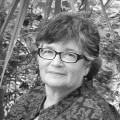Robert Yune is the author of Eighty Days Of Sunlight, a novel forthcoming from Thought Catalog Books. His fiction has appeared in The Kenyon Review, Avery, and Los Angeles Review, among others. In 2008, he received a fiction writing fellowship from the Pennsylvania Council on the Arts. He teaches at the University of Pittsburgh.
*
Robert Yune: As the title suggests, memory plays an important role in this novel. In general, what is the value of memory nowadays, especially in a society where seemingly everything is recorded, tracked, or documented?
Sandra Gail Lambert: Documenting an event is not the same as telling a story. Memory is not the same as a story. And the poet Jeff Newberry has pointed out that "destroy" is an anagram for "de-story." You can log a place to death, but you also destroy a place when you lose its stories. And that's why I think today's daily recording of everyday life is a grand and wonderful aspect of our lives. This is what stories are made of. Within the minutiae are stories already waiting. And when an era has passed, fiction writers will be able to find them and also use the wealth of material to make up their own. This is one way the heritage of us ordinary people will inform the future.
RY: People often say that that setting, when written well, becomes a character in its own right. Aside from research, how did you bring the titular river your new novel to life?
SGL: Each of my characters has a relationship with the river. For some, it's their livelihood, and for others, it's a place of solace or a playground or a source of pain. For still others, it's a River Styx, a passage into death. All these varied observations and experiences, I hope, build and reveal the character of the river. When a feverish woman wanders through the devastation of a logged riverbank or a little girl hears the blast of a steam whistle that precedes the first paddleboat loaded with European tourists to come up the river, crises in the life of this river are revealed.
But it was also essential to show the consistency of the river through the years (centuries, really). Potters from1528 and 1997 dig for clay along the river's banks, and both are comforted by the river in extreme moments. Young sisters who live on the Florida frontier of the 1800s, lovers from the 1940s, and a trader from ten thousand years ago each drink sweet water from the river's underground source. All these lives reflect the river's vulnerability to the sudden onslaughts of civilization as well as a vast, non-human strength and a long existence through geologic time.
RY: The novel contains some moments of shocking violence. Were these scenes difficult to write? Even beyond the intense subject matter, I’m always impressed when writers can select precise details or describe the geometry of fights—who’s standing where, etc.
SGL: No, they weren't. I mean, not more than any other scene. And this, I think, is where having been disabled all my life is a factor. Disabled people write all sorts of things in all sorts of ways, but we nearly always include the body. We don't leave it out. And writing what I call "from the body" gives us the experience of writing physical scenes in a precise, clear, and, I think, effective way.
RY: None of the female characters in this novel has children—this seems like a significant decision on your part. Was this freeing, or did it create its own set of challenges?
SGL: I wanted to write characters whose worth was not determined by the passing on of a genetic heritage. These women were (and are) sometimes called "barren." I myself am a dead-end on a genealogy chart. The implication that they/we have nothing to offer the future, no heritage, pisses me off. It was also important to me that, besides having no children, these women would not be famous. I wouldn't call them ordinary, but the lives they led, their accomplishments, were not the kind that would have ever made it into a history book. The challenge, then, was how to show how their lives changed the people around them and what they offered to the future. So I bound each of them to this river and then used the river to carry their legacies forward.
RY: One last question: I’m sure other interviewers have asked, or will ask, about kayaking, Florida, or research. What’s the one question you wish interviewers (or readers) would ask about the novel?
SGL: No one asks about race. And issues of race show up in the novel. I mean, I'm a white lady who writes in first person about the lynching of a man who has escaped from slavery. That's risky, and it's likely I made mistakes. I also write about a transgendered African-American who is part of an armed protection group for civil rights workers. And in the novel, I got to use the almost hidden history of Paradise Park, a 1940's and 50's amusement park for black people that existed along the river. Families came from all over the United States to spend time there. But no one has ever asked a question or made a comment about any of this.

